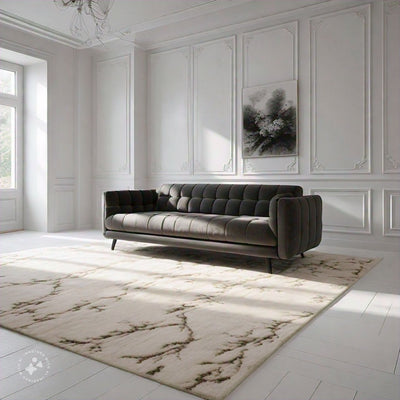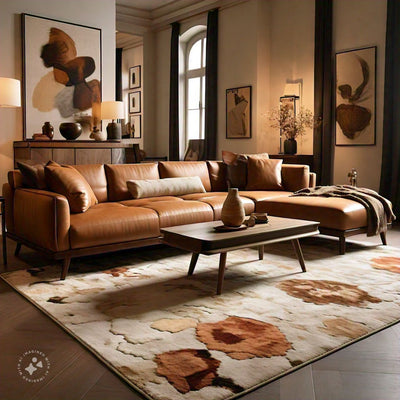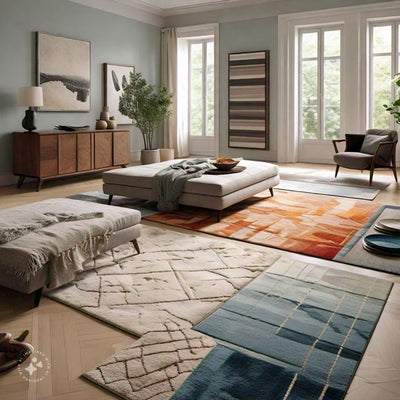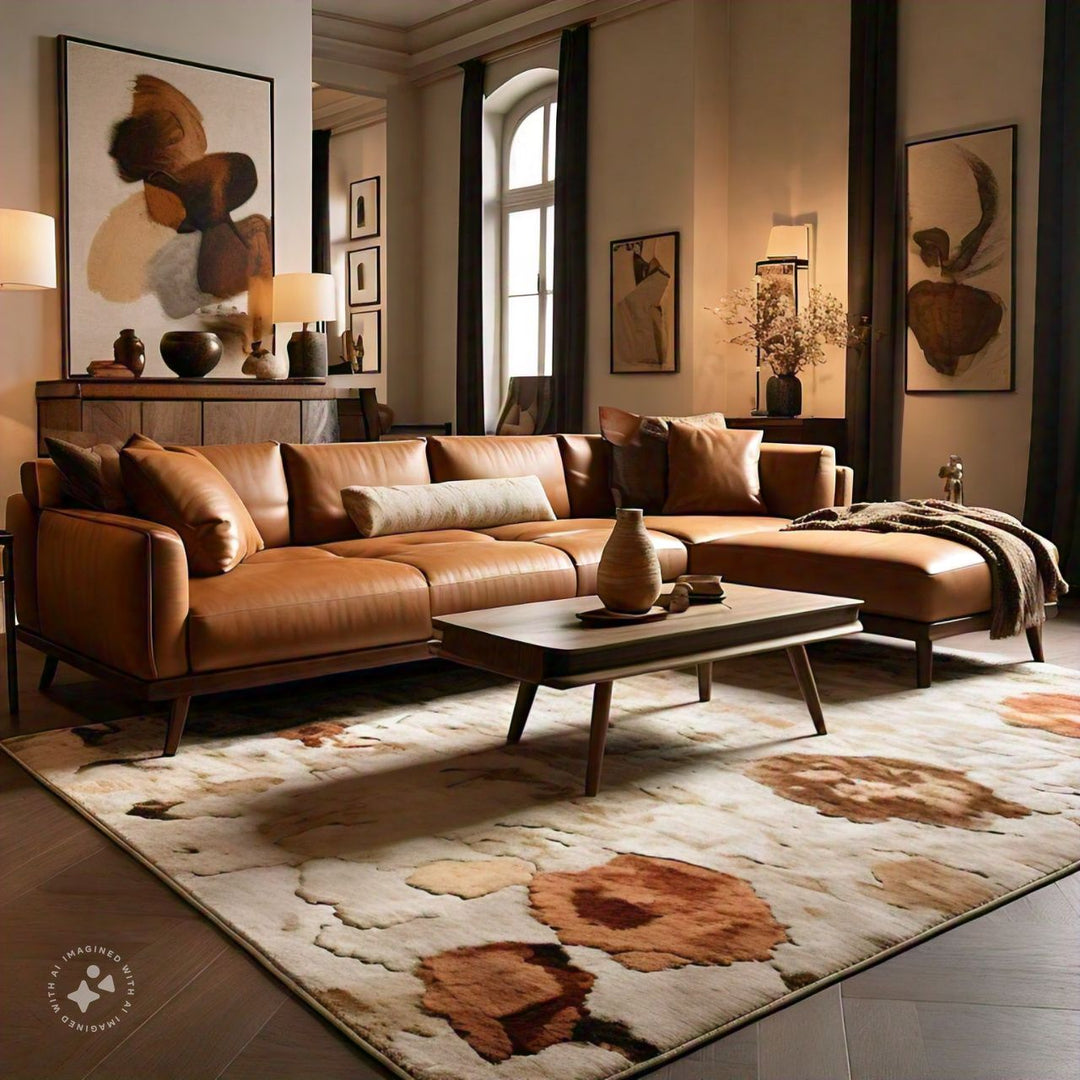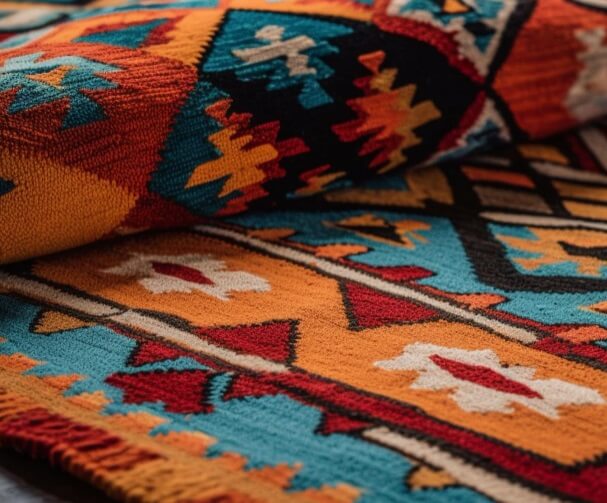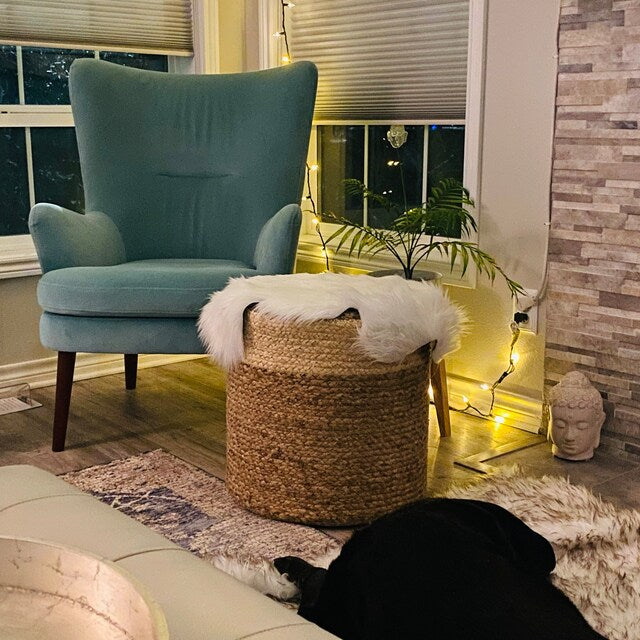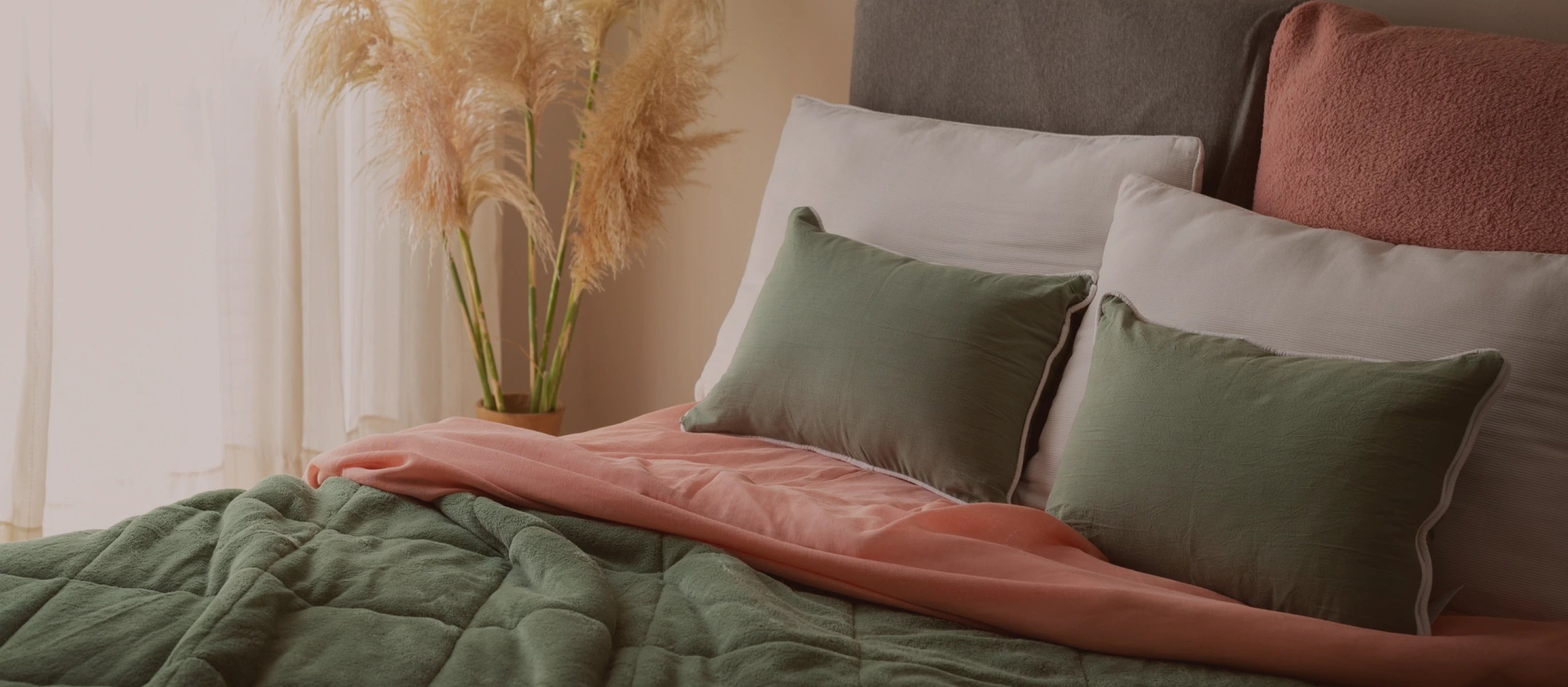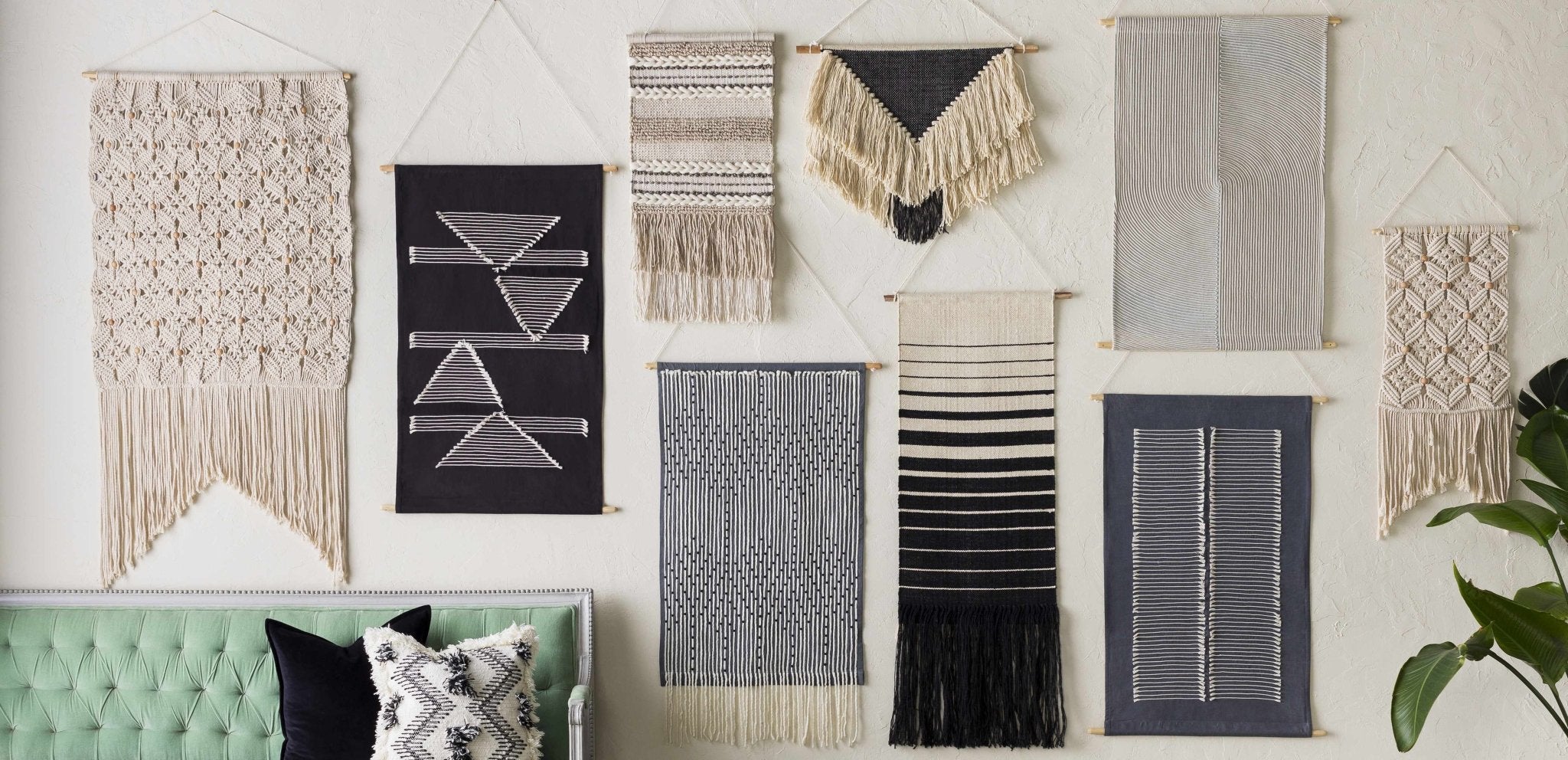What are Low Pile Carpets? Benefits, Types and Care Tips
Most facets of life frequently experience "trends" that change over time, and it is the same with home décor items. However, the one thing that never seems to go out of style is carpet! Carpets come in a variety of types, including woven, cut loop pile, deep pile, and low pile. However, knowing what type of carpets to choose in terms of their texture, and thickness is crucial. In this post, let’s check out what is low pile carpet, its various types, and how you can purchase one for your home.

What is a Low Pile Carpet?
The carpet's pile is made up of fabric loops that give it its plush surface and long-lasting appeal. When a carpet is described as having a "high pile," this indicates that the fibers are taller and looser. So, what is a low-pile carpet? It is simply the variation that features shorter carpet threads and tighter loops. It is the design that has remained in the highest demand over time and is the subject of this essay.
Choose a low pile rug with a fun or distinctive design to keep it from blending in with the rest of the flooring because the fibers of low pile rugs are tight and low to the ground and serve more for utility than for aesthetics. Refer our rug glossary page to learn about various rug terms.
Benefits of Low Pile Rugs over High Pile Rugs
Low-pile rugs have several advantages over the high-pile ones, including being easier to maintain, better for indoor allergies, and more "kid friendly."
High durability
Short fibers are used to create low-pile carpets, which have a flat, solid appearance. Because of the short threads, maintenance is simple and vacuuming is seamless (especially when it comes to bulkier flooring options like shaggy rugs).
Additionally, the short fibers distort foot traffic since they are less likely to sink under heavy use than higher pile alternatives. Therefore, the low pile type is naturally chosen by experts if you're seeking hallway carpet ideas that will never go out of style. However, its advantages go beyond just being long-lasting.
Simple maintenance
Low-pile carpets offer a smoother surface than other types, which makes upkeep simpler. Because there is less room for dirt and filth to hide because of the short length of the fibers, your vacuum cleaner will operate more effectively and efficiently. The tight weave reduces the likelihood of stains happening frequently.
Filters allergens
Use low-pile carpets to filter out allergens from the air if any family members have allergies or respiratory issues. This is so that anyone prone to allergens and severe asthma attacks can benefit from the low pile's obvious cleaning advantages over high pile carpets. Additionally, low pile is more dust mite-resistant than its competitors.
The best material is by far wool because it is resilient and hypoallergenic, trapping dust and pollen as well as other allergens in the pile. Looking for a less expensive choice? Even in the same materials, low-pile carpets made of nylon and polyester are preferable to high piles for allergy patients.
Fantastic for kid's rooms and play areas
Harder surfaces like wood and tile can cause painful bruising or even more serious injuries. It is a problem, especially if you have kids at home. The soft texture of low pile carpet helps to prevent painful "rug burns" and can ease your child's landings when used in conjunction with appropriate padding. Choosing the right kind of carpet for your needs ultimately comes down to usage and personal preference.
Offers natural cooling
Low-pile carpets can be the answer you're looking for if you're trying to figure out how to keep a house cool during a heat wave. Even though shaggy rugs and other thick-piled rugs may look nice and feel cozy underfoot, they effectively trap heat.
These thick carpets will retain all of the heat from hot air entering your home through open windows and sunlight, making your space warmer for a longer period. Consequently, even though high-pile carpets may be advantageous in the cooler months, it can be worthwhile to investigate a low-pile alternative if your home experiences heat-related problems.
Shop This Hand Knotted Traditional Low Pile Wool Rug
Low-pile carpet types
When looking for low-pile carpet types, it's essential to be aware of your options. These carpet varieties are further divided into groups based on their texture, build quality (construction), stain resistance, type of carpet fiber, and coloring technique. Here are a few factors that determine the various low-pile carpet types based on construction.
Fiber Class
The type of fiber used in a carpet impacts its performance and feel in several ways. Common fibers for low pile carpets include:
- Wool: Naturally soft and luxurious, wool rug is eco-friendly but requires more care and is usually more expensive. Woolen carpets are attractive and stain-resistant by nature, but they stain too easily.
- Nylon: Known for its strength and resilience, nylon is a top choice for high-traffic areas.
- Polyester: Offers vibrant color options and is resistant to stains, though less durable than nylon.
- Olefin (Polypropylene): Moisture-resistant and affordable, making it ideal for basements and outdoor areas. Olefin has good resistance to moisture but a low durability rating.
Construction
The construction of a carpet determines its durability and appearance:
Loop Pile: Features loops of fiber that stand upright. It's durable and great for high-traffic areas.
Cut Pile: Loops are cut to the same height, giving a plush, even surface.
Cut and Loop Pile: A combination of cut and looped fibers creates patterns and textures.
Related: About Carpet Pile Height
Using a tufting machine, the bulk of carpets intended for domestic use are made. An enormous sewing machine that loops a large number of fiber strands onto the carpet backing is known as a tufting machine. The plush side of your carpet is created as a result.
The carpet is more resilient to matting and has threads that are tightly twisted. Frieze, which has around 9 twists per inch, is the style of low pile carpet that is most tightly twisted. The loosest twists are seen in cut pile carpets, which makes them seem softer to the touch but also more prone to unraveling.
Checking the fiber density is another technique to tell a correctly constructed low pile carpet from a poorly made carpet. The carpet can withstand wear and tear better the more closely the looped strands are packed.
Textures
The texture of a carpet influences its look and feel underfoot. Low pile carpets can have different textures:
Level Loop: Loops are all the same height, providing a smooth and durable surface.
Multi Level Loop: Loops of varying heights create a textured pattern.
Saxony: Smooth and plush, with cut fibers standing straight up.
Berber: Typically made with looped fibers, often in a speckled color pattern.
Related: Types of Rug Textures and Choosing the right one
Resistant to Stains
The degree of stain resistance your carpet will have will depend on the type of carpet fiber you choose. However, modern carpets include additional stain-prevention measures that are applied after they are made. These can improve the stain resistance of any kind of material.
Dye Method
Solution Dyeing: Color is added to the fiber during its liquid state, resulting in vibrant, fade-resistant colors.
Piece Dyeing: Fibers are dyed after the carpet is constructed, allowing for a wide range of colors and patterns.
The technique used to color low-pile carpets is another way to group them. The post-tufting procedure on woven carpets typically involves continuous coloring. It works well to produce pleasing, solid hues.
Typically, solution-dyed carpets have their fibers colored before being woven. As a result, even when you use abrasive cleaners on them, they will not fade as quickly and are slightly more resistant to stains.
When Should You Choose a Low Pile Carpet?
- High Traffic Areas: Their short fibers are less likely to mat down, making them ideal for hallways, living rooms, and entryways.
- Easy Maintenance: Low pile carpets are easier to clean and vacuum, as dirt and debris sit on the surface rather than getting embedded.
- Allergy-Friendly: With less fiber to trap dust and allergens, low pile carpets can be a better option for people with allergies.
- Modern Look: They provide a sleek, streamlined appearance that fits well with contemporary home decor.
How to select the right carpet for your place?
If you choose the wrong carpet, it could fade, wear out quickly, or develop stains that defiantly defy your best cleaning attempts. With the help of this carpet-buying advice, you can safeguard your investment and pick the ideal flooring for your house.
Choose the right padding
Don't give in to the urge to save a few dollars by compromising on carpet padding. Carpeting depends on a layer of padding for support, strength, and a little extra cushioning, just like a building needs a sturdy foundation.
Related: Are Rug Pads necessary?
Experiment with different styles
Although each design has a unique appearance, that shouldn't be your main priority. Instead, consider how well a particular carpet style fits with your way of life.
Keep the budget in mind
Even the most expensive carpet need not be extremely expensive. To discover a carpet that suits your needs and budget, do some research. To properly compare different vendors, always ask for separate prices for materials and installation.
Select the right seller
A high-quality carpet retailer will offer a wide range of carpet options, including several fiber types. Your queries should be quickly answered by staff members, who should also allow you to take samples home.
Inquire about maintenance needs
Before making a purchase, make sure to question the salesman about the product's cleaning and maintenance requirements. Learn how frequently you should clean and what specific tools or materials the manufacturer suggests.
Pattern and color comparison
The hardest part of choosing a carpet may be choosing the finish because there are so many different colors and designs to choose from. By selecting hues that go with the general ambiance or tone you want to create in each space, you may focus your search.
How do Low Pile and High Pile Carpets Differ?
Low pile and high pile carpets differ primarily in the height of their fibers:
- Low Pile: Shorter fibers, making them durable, easy to clean, and suitable for high-traffic areas.
- High Pile: Longer fibers, offering a plush and cozy feel, but more challenging to clean and prone to matting, making them better for low-traffic areas like bedrooms.
Low-pile carpet care and maintenance
Vacuuming
The simplest and most effective approach to keeping the carpet clean is to routinely vacuum it. High-traffic areas should be swept more frequently than other areas, with all floor coverings at least once a week. Place cleaning
Spot cleaning
The majority of stains that are difficult to remove are not the consequence of the spill itself but rather of the cleaning procedure. Spots, stains, and spills should be cleaned up quickly for optimal results.
Preventive actions
Avoiding letting dirt into the house is the most efficient technique to lessen or avoid soiling carpets and rugs. Rugs should be regularly shaken or struck with a brush to remove soil for maximum advantage, as once they become loaded with soil, they serve as a source for new soil.
Reductive actions
Deep cleaning is one type of restorative measure. Embedded abrasive soil can be removed using restoration cleaning. To protect carpet finishes and life, restorative cleaning should be done before the soil in the carpet is obvious.
The Rug Decor’s Range of Low Pile Carpets
At The Rug Decor, we offer a diverse selection of low pile carpets to suit any style and need. Our range includes:
Durable Loop Pile Options: Perfect for high-traffic areas
Soft Cut Pile Choices: Ideal for living spaces where comfort is key
Textured Designs: Adding visual interest and character to any room
Vibrant Colors and Patterns: From solution-dyed to piece-dyed, we have a variety of color-fast options that ensure your carpet looks great for years to come
Whether you're looking for a practical solution for a busy household or a stylish addition to your modern home, The Rug Decor has the perfect low pile carpet for you.
FAQs
How often should I vacuum my low-pile carpet?
While there is no thumb rule regarding vacuuming carpets, it is best to try cleaning twice a week to keep your home dust and pollen free.
What is the best way to deep clean my low-pile carpet?
Procedures such as steam cleaning, soaking in a solution of vinegar and baking soda, washing with a carpet cleaner, and more are the best ways to deep clean a low-pile carpet at home. Professional deep cleaning is still recommended.
Can low pile carpet be installed over heat flooring?
Yes, it can be installed over under-floor heating, but it is best to inquire about the same at the time of purchase.
How to know if my carpet is a high or low pile?
The primary difference is that in a high-pile carpet, the fibers are longer, resembling that of shaggy rugs. However, for low-pile carpets, the fibers are shorter and trimmed.

